|
My Maternal Grandmother
- ELIZABETH TICHY 1892 - 1943
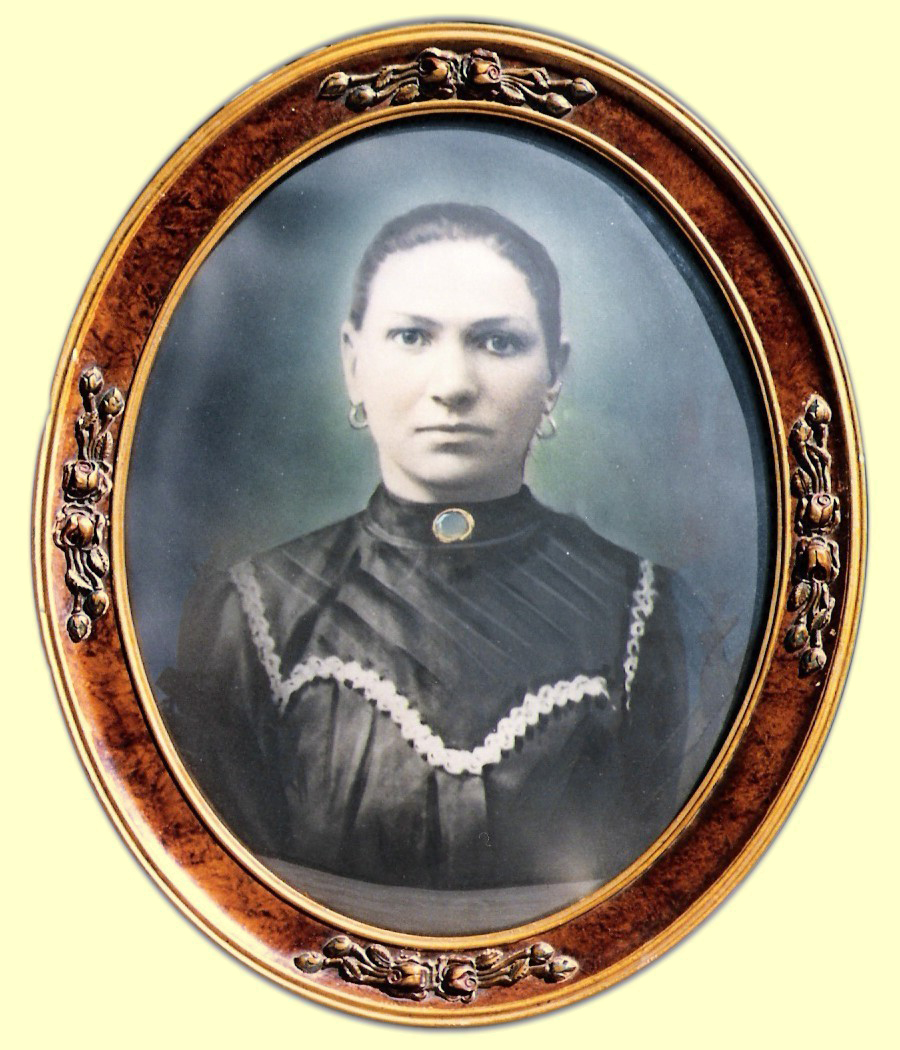
Descendants of Joseph Tichy
and Magdalena Dorn
- Joseph Tichy. b. 1850, d.
abt 1899 Taku-Eli, Crimea, Russia.
Magdalena Dorn. b. 1862
Wasserau, Prischib colonies, m. 1881 Kherson Catholic
Church Parish, d. aft. 1925
- Emelia Tichy. 1880, Klosterdorf,
Kherson Region
- Rose Tichy. d. abt 1918/19, Crimea
- Ivan Tichy.
- Fyodor (Theodor) Tichy. 1888
- Frederick Tichy.
- Elisabeth Tichy. 1892 Kherson
Region. d. 1943 Medicine Hat, AB
- Joseph Tichy. 1893 Lvove Colony,
Kherson. d. abt 1921/22, Crimea
- Christopher Tichy.
- Paulina Tichy. 1896 Lvove Colony
- Nikolai Tichy. 1898 Lvove Colony
In the Russian
script, “Tichy”
looks like this: ТИХИЙ. It
looks slightly different in hand-written script, with
a “u” replacing the “и”,
and sometimes a letter which looks like our “M’
replaces the “T”. In Russian, the word
ТИХИЙ means “quiet”.
"Where is Lvove Colony, Kherson
Region, Ukraine?"
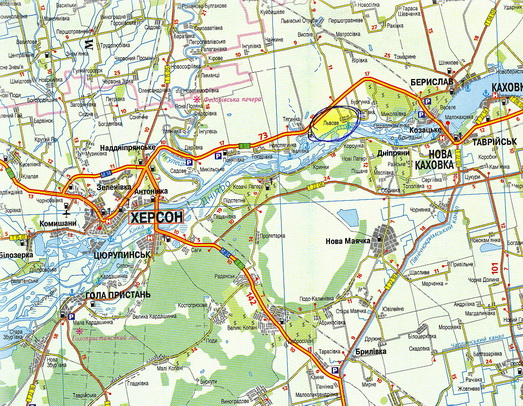
My Grandmother's Death Certificate
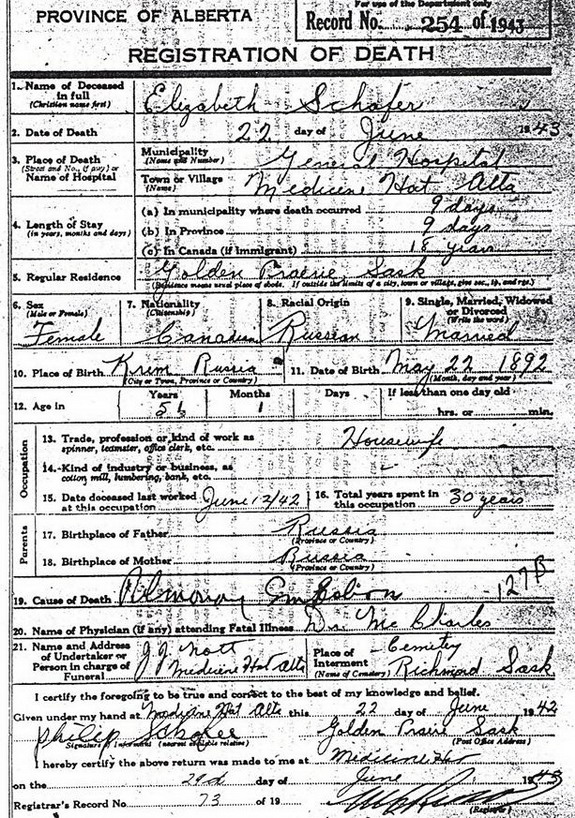
Death of
Elisabeth Schafer, 22 June 1943
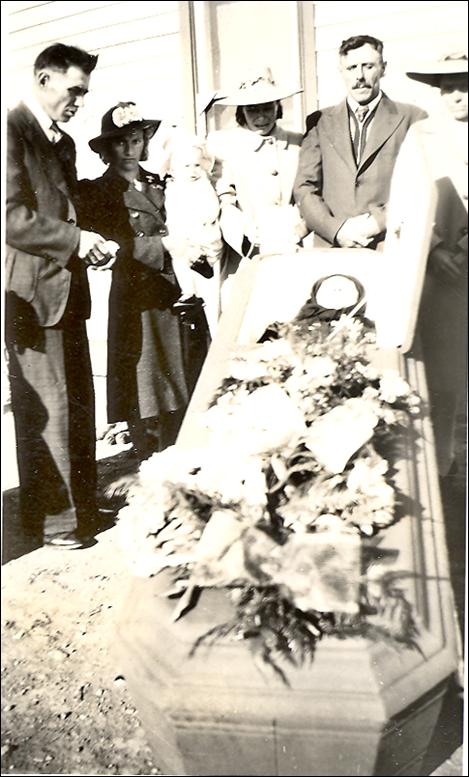
At the Schafer farm before
the burial. (above)
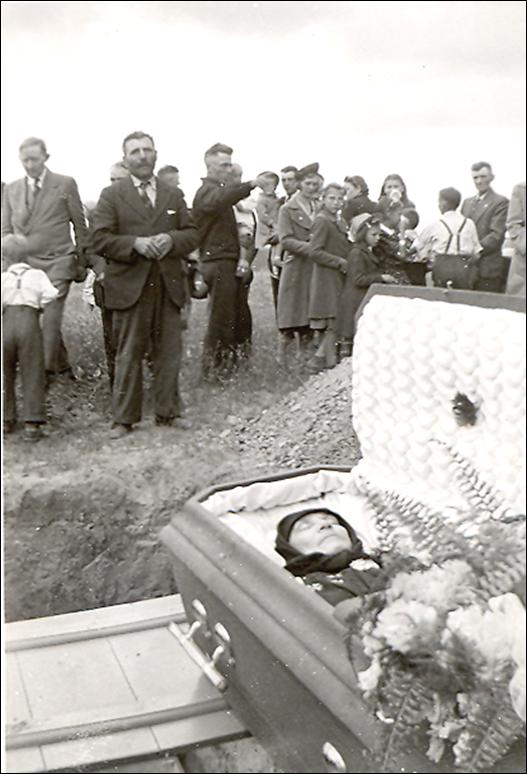
Funeral of Grandmother
Elisabeth Schafer, Richmound cemetery, SK
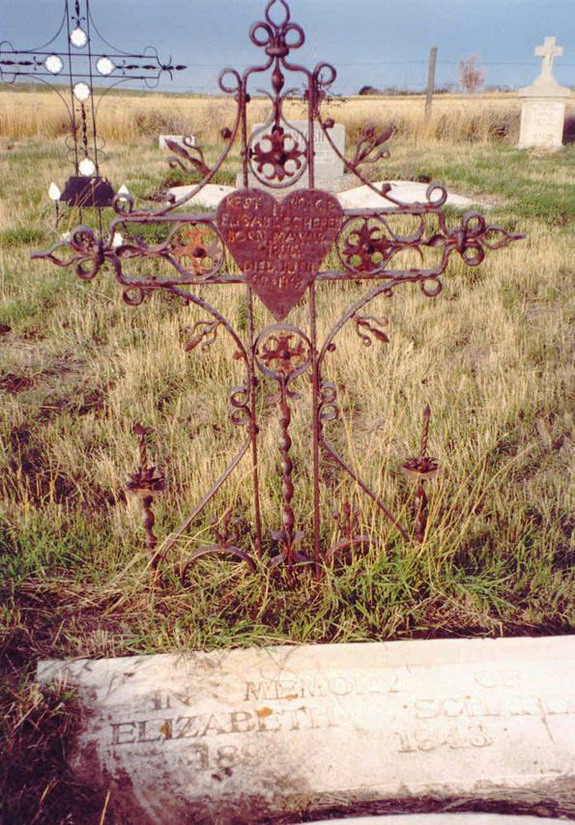
My Grandmother’s
Grave, Richmound Cemetery , SK.
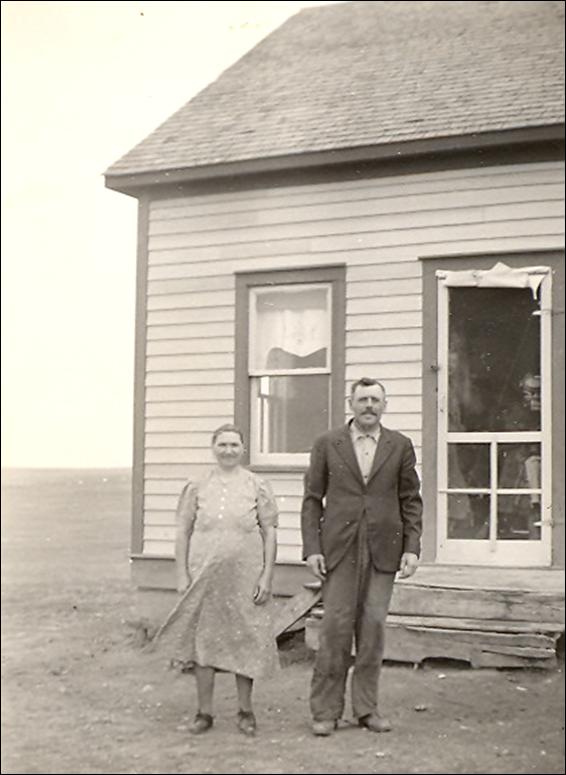
Grandfather and Grandmother Philip & Elisabeth
Schafer on their farm.
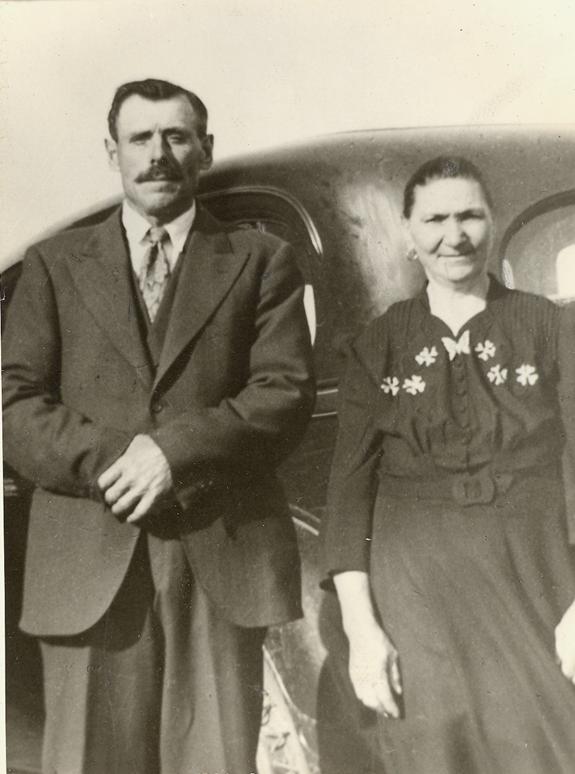
The last known photo of Grandmother
before she went into the Hospital in Medicine Hat in June,
1943. (above)
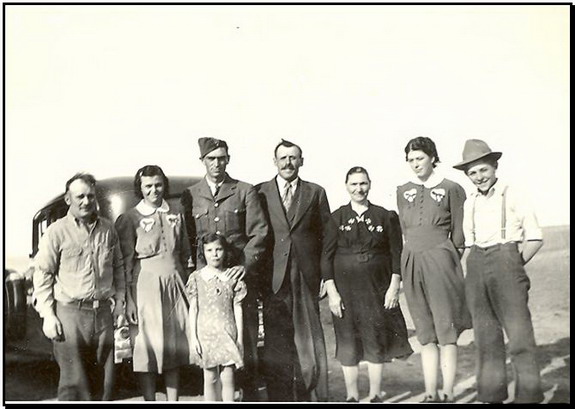
Schafer family photo taken on the day Grandmother Elisabeth
went into the Hospital in Medicine Hat . I am guessing
my Dad took this photo. L-R: Bill Stock, Aunt Katie,
Uncle Jack, Penny (in front of Jack), Philip, Elisabeth,
Rose (my Mom), Andrew. Missing is Uncle Nick.
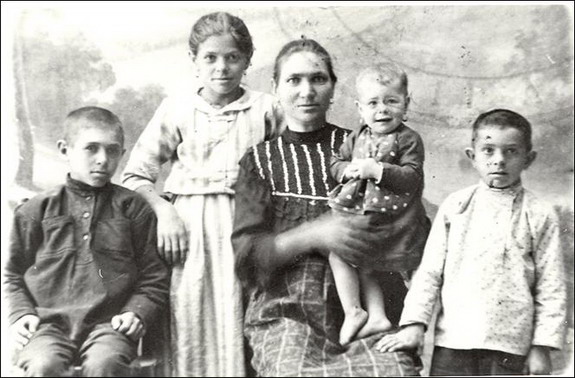
Passport Photo on Grandmother’s
Passport, 1924. L-R: Nick, Katie, Elisabeth, Rose,
Jack.
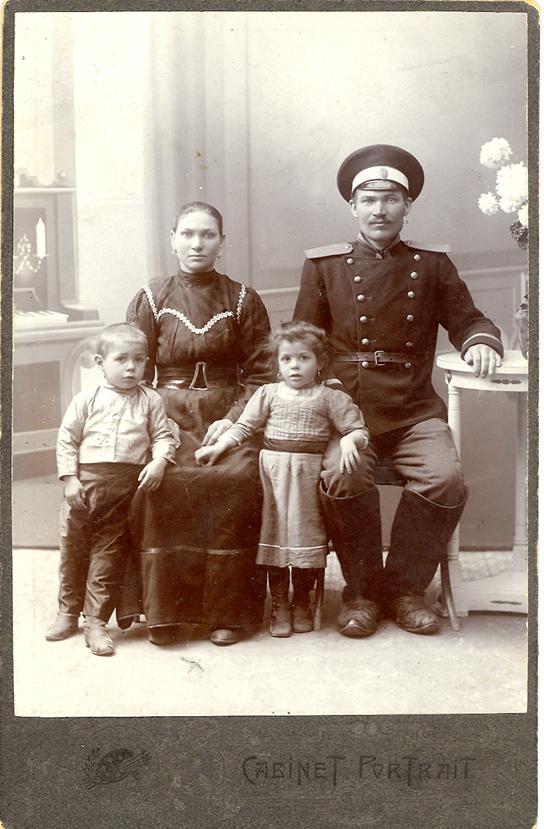
Photo taken in Crimea of Elisabeth and her brother, with
twins Nick and Katie. Photo ca. 1916
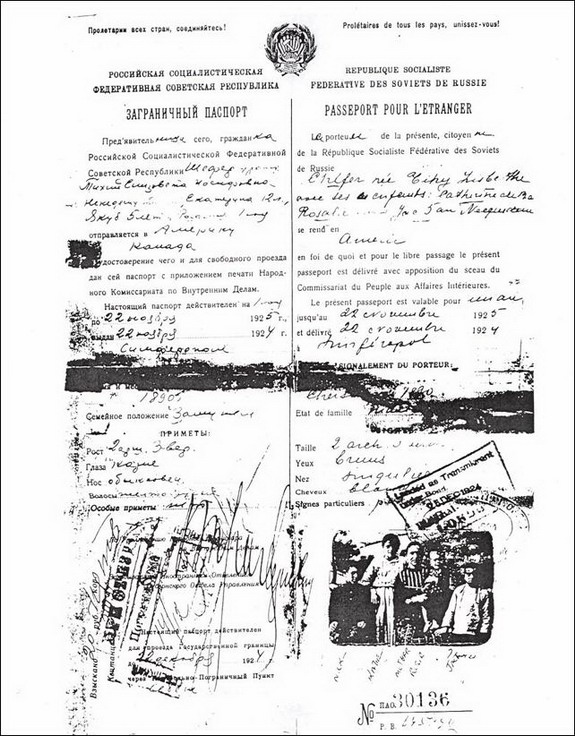
Grandmother’s Passport # 30136 Written in Russian
and French, page one.
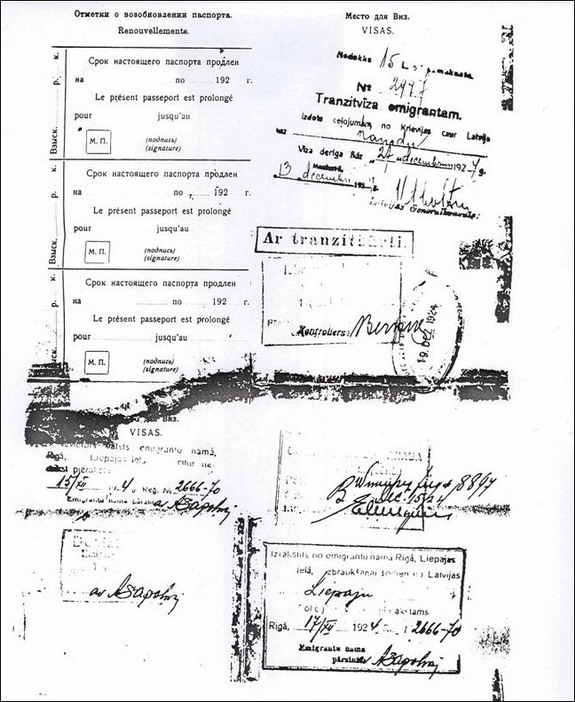
Page two of Passport showing stamps enroute.
They traveled by train through Riga to the port city
of Libau , in Latvia . A small steamer took them
to Hull , England . Again by rail, they crossed England
to Liverpool, where they departed on the Montlaurier on
26 December, 1924 , headed for Saint John , New Brunswick
.
___________________________________________
TRANSLATION OF GRANDMOTHER’S PASSPORT
Proletarians of all countries unite!
Russian Socialist Federal Soviet
Republic
Foreign Passport
The bearer of this passport, citizen of the Russian Socialist
Federal Soviet Republic , Schafer, Elisaveta, Iosifovna,
born Tichy, with children:
Nikodemus, 12 years old, Ekaterina, 12 years old, Jakob
5 years old, and Rosalia, 1 year old, is departing for
America, Canada.
This passport, with the official stamp of the Department
of the Interior is issued to certify the above information
and to ensure unrestricted passage. This passport
is valid through November 22, 1925 and is issued on November
22, 1924 in the city of Simferopol .
Place of Birth - Kherson
Year of Birth - 1890
Marital status - married
Features:
Height: 5 feet, 2 inches
Eyes: brown
Nose: regular
Hair: blonde
Distinctive features: none
Head of the Regional Office of the Department of the
Interior: [signature]
Head of the Foreign Section of the Department: [signature]
Official Stamp
This passport is valid for crossing the state border
via the Central Frontier Post in Sebezh. Valid through
December 22, 1924 .
Passport # 31136 Paid in fees: 20 roubles
Passport Extensions and VISAS:
#2947. Immigrants in transit passing through Latvia
to Canada .
Visa expires on December 27, 1924 .
Date of issue: December 13, 1924 .
Riga , Latvia , December 15, 1924 . Registration
# 2666-70. Immigration Officer. [signature] [stamp]
Riga , Latvia , December 17, 1924 . Registration
# 2666-70. [signature]
___________________________________
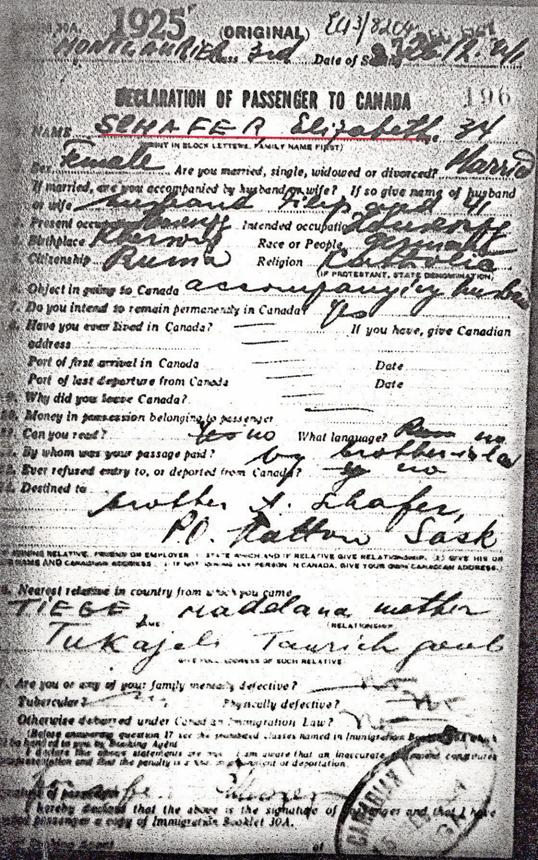
Declaration Form filled out upon Entry into Canada ,
05 January 1925 – page one.
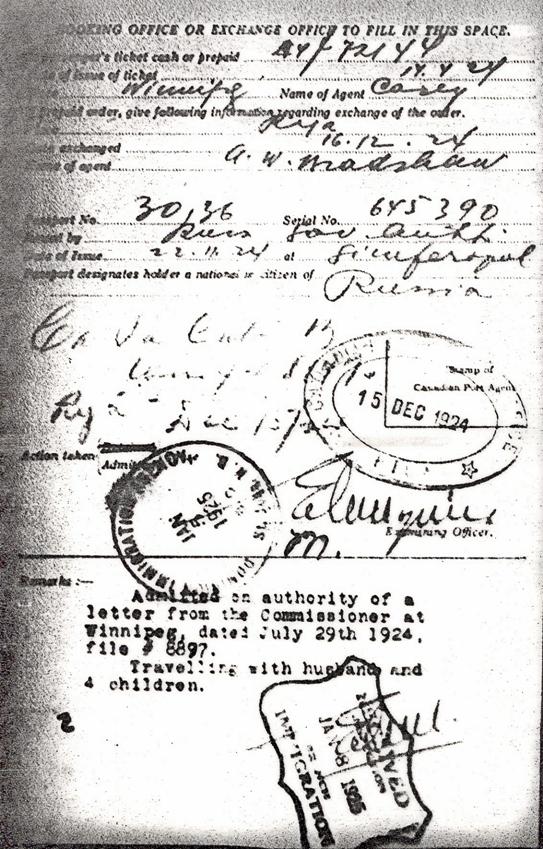
page two.
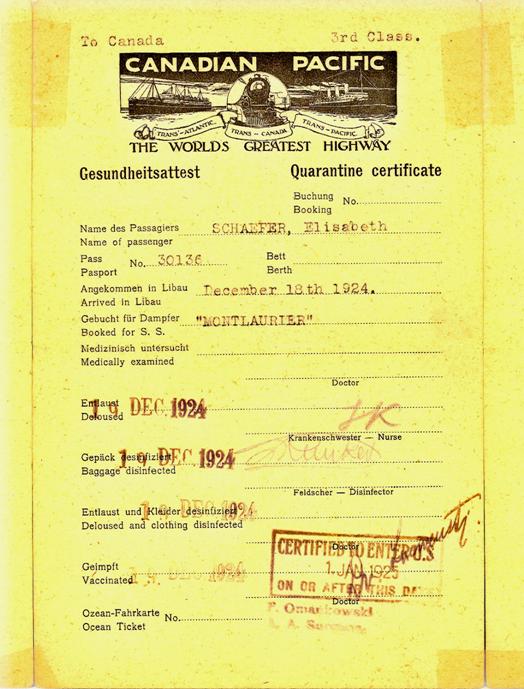
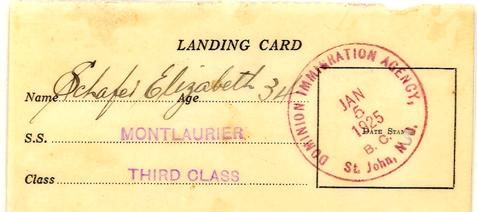
________________________________________________
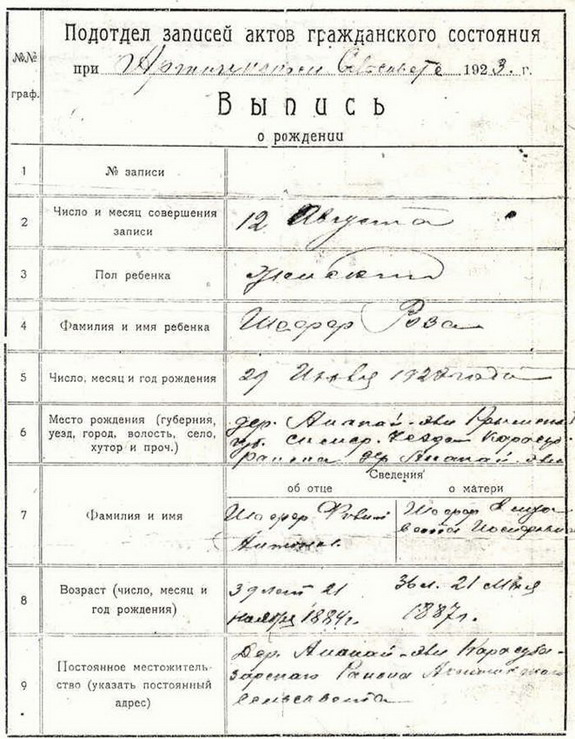
My mother’s Russian birth
certificate – page one.
___________________________
"So . . . just when was Grandmother Elisabeth
Schafer born?"
On her death certificate, information supplied by Grandfather,
Elisabeth was born 22 May, 1892 . Having died on
22 June 1943 , her age at death was given as 51 years,
1 month.
On her passport, Year of Birth is given as 1890.
On her Declaration Form, filled out 05 Jan 1925 , her
age is given as 34, which coincides with 1890 as Year
of Birth.
On my Mother’s birth certificate, (look in Box
8 preceding page) – on 29 July 1923 , Elisabeth’s
age is given as 36 years, with birth date of 21 May 1887. Philip’s
age is given as 39 years, born on 21 November 1884 .
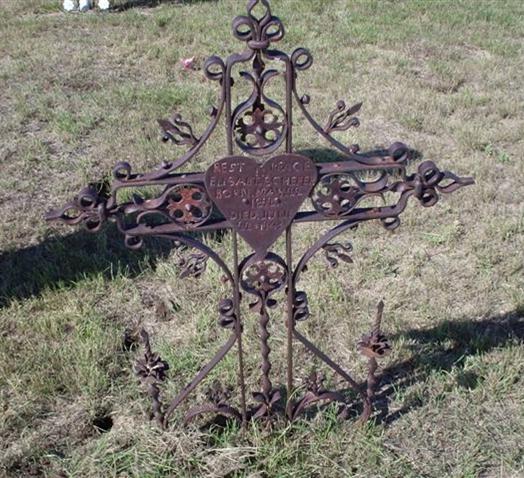
Grandmother’s Iron Cross ________________________________________
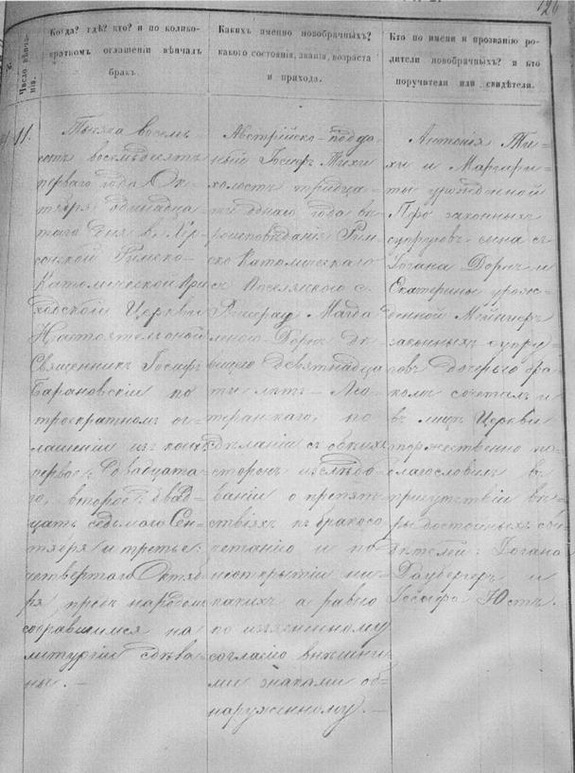
Church marriage record of Joseph
Tichy and Magdalena Dorn. 12 October 1881
Translation of marriage record of Grandmother’s
Parents
No. 11
When, Where, Who begins Marriage
1881, October 12, Kherson Roman Catholic Church Parish,
Pastor Joseph Baranovsky. Waiting periods of September
21, September 27 and October 4 for the marriage.
What are the names of newlyweds, What are their ages,
and what is their religion?
Austrian citizen Joseph Tichy, single, 31 years old,
religion Roman Catholic Church and citizen of Dorf Wasserau
and girl Magdalena Dorn, 19 years old, Lutheran, arrangement
side for marriage.
What are names of the parents and who are the witnesses?
Anton Tichy and Margarita (born Pfoh) legal spouse, their
son Joseph Tichy. Johann Dorn and Katherina (born
Meinier) legal spouse, their daughter Magdalena Dorn. Joseph
Tichy and Magdalena Dorn were married.
Witnesses Johann Thauberger and Joseph Youst. There
were no obstacles to this marriage.
Translation by Valentina Fromm Kramer. Sept 2008
________________________________________
Comments: At the time of marriage,
Joseph Tichy was listed as an Austrian citizen, resident
of the Lutheran village of Wasserau , in the Prischib
colonies 50 km north of Melitopol , Ukraine . Melitopol
is about 150 km east of the city of Kherson , Ukraine
. The Tichy men were not farmers, and hence had not acquired
Russian citizenship. The earliest Tichy for whom
I have information was Franz Tichy and he was a “Gebietschreiber”,
similar to a municipal administrator of sorts, and he
moved around a great deal. An Odessa Archive record
also shows him to be a manager of an agricultural estate
in the Nikolaev region in 1846. Census records from
1917 indicate two Tichy men had recently applied for Russian
citizenship, implying, I have been told, that they had
never been property owners. I have no idea what Joseph
Tichy was doing in Wasserau, but we know from later birth
records of his children, that he was no longer living
there.
The Dorns, on the hand, were original settlers in Wasserau
when it was colonized in 1805. Friedrich Dorn (44
yrs old in 1811) and his wife Rosina appear on Dr. Karl
Stumpp’s list of original colonists for Wasserau. I
do not know at this point if Magdalena Dorn was a direct
descendant of Friedrich Dorn. Stumpp shows seven
Dorn men as emigrating to South Russia in the early 1800’s,
but Friedrich is the only one listed as going to Wasserau. Perhaps,
Johann Dorn, Magdalena ’s father, was a son to this
Friedrich.
Joseph, 31, married Magdalena , 19, in October of 1881. Kherson
Church records reveal a daughter, Emelie, born to this
couple 06 February, 1880 . Magdalena would have been
a young un-wed mother.
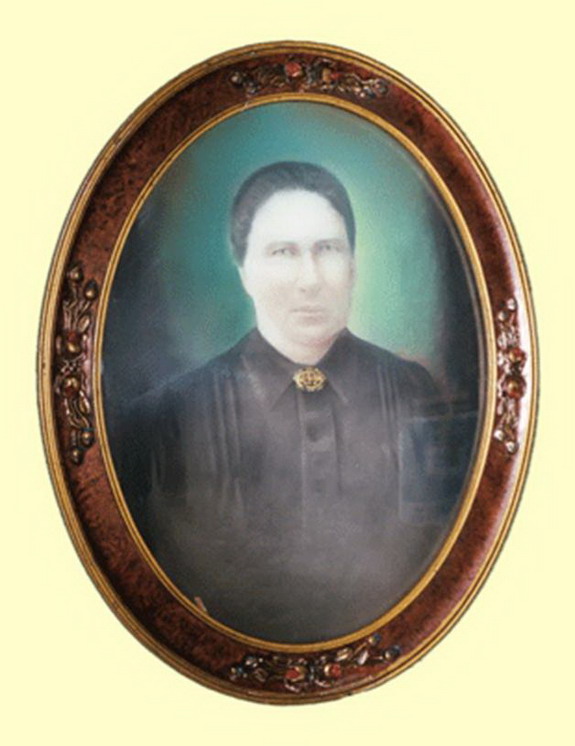
My Great-Grandmother Magdalena
Tichy, born Dorn - 1862 – d. aft. 1925
______________________________________________
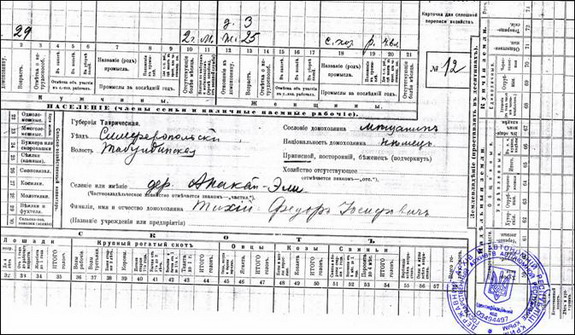
This is a copy of a 1917 census card obtained from the
State Archives in Simferopol, showing the Archival stamp
lower right. I obtained this copy on a personal visit
to the Archives with Karolina Fromm in June of 2006. The
translation (by Inna Stryukova) follows:
Fond 27, Opus 7, delo 11058, list 77
Tichy, Fyodor Josephovich, a tenant, the village of Anakoi-Eli,
Tabuldinskaya volost, Simferopol Uyezd, Taurien Gubernia. 29
years old, was absent for two years at the time of the
census, as he was drafted to the army. Married, his
wife was 25, his daughter was 3.
Comment: This son of Joseph Tichy, living in Anakoi-Eli
in 1917, must be a brother to my grandmother Elisabeth. Based
on his age, Fyodor was born in 1888. ______________________________________
Other evidence of Fyodor Tichy. In the Book
of Memory (which lists the people who died during
World War Two) these names were found:
Tichy, Nikolai Fedorovich, born 1905 in Simferopol ,
a soldier, was killed 29 April 1944 , buried in Sevastopol
area of Crimea .
Tichy, Ivan Fedorovich, born 1928 in Saki district, village
of Mikhailovka, Russian, a soldier, was killed 07
October 1944 , buried in city of Kelme , Lithuania .
(translation by Inna Stryukova ) Fyodor Tichy born
1888 would have been quite young to have a son born in
1905, so possibly there is an error somewhere on the ages. Two
sons of Fyodor, born 23 years apart, is a strong indication
of two different mothers, but not necessarily fact.
Perhaps, it is Fyodor seated with Elisabeth and the twins
Nick and Katie, on page 11.
_______________________________
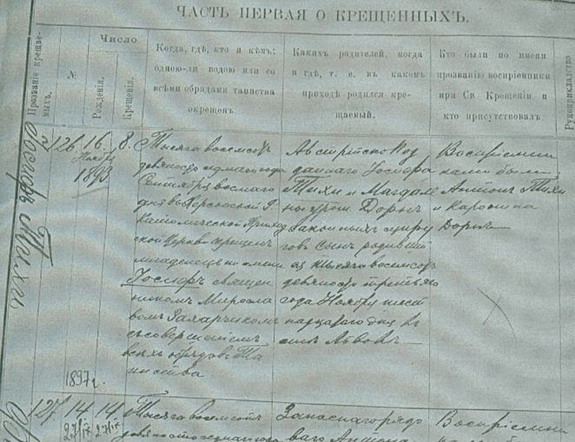
# 126 Name: Joseph Tichy
Date born: 16 November 1893
When, where, who, and how at baptism: 08 September
1897 , in Kherson Roman Catholic Church Parish, a baby
named Joseph was baptized by priest Miroslav Zakharchik
with the observation of all the ceremonies and sacraments.
Parents, when, and from where, in which parish the baptized
was born: Austrian citizen Joseph Tichy and Magdalena
born Dorn, legal spouses’ son, born in 1893 on 16
November in the colony of Lvove.
Godparents and those present: Godparents were Antony
Tichy and Karolina Dorn.
Translation by Inna Stryukova of Nikolaev , Ukraine . (Inna
spelled family name as Tihy.)
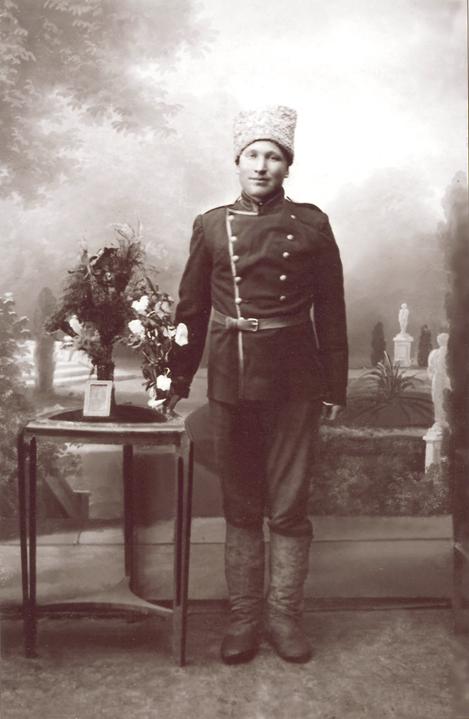
Joseph Tichy, 1893 – 1921/22
Inscription on back of photo:
To my godchild, Katerina Philipovich Schafer. From Josef
Josefovich Tichy
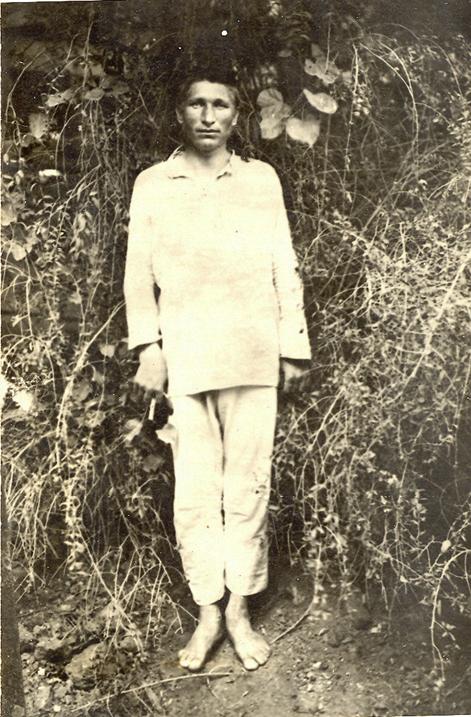
Name on back of photo: Josef Josefovich Tichy
As children, were told by our mother that this Joseph
Tichy starved in Crimea during the first Famine which
followed the Revolution in Russia .
_________________________________
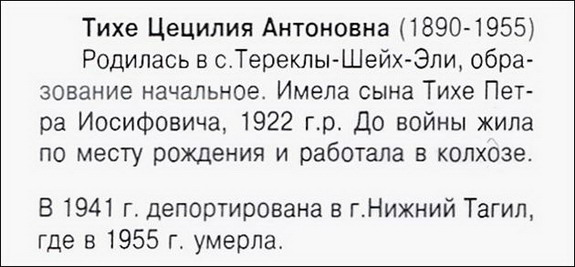
Above excerpt from Hilda Riss book, Crimea ,
Our Fatherland. (Krim – Nasha Rodina). Page
245.
The translation would go like this: (Translation
by Valya Fromm Kramer, 13 Dec 2008 )
Tichy, Ceciliya Antonovna, (1890-1955). Born in Terekli-Scheich-Eli,
Education elementary. She had a son, Tichy, Peter Josephovich,
born 1922. Before war she lived in Terekli-Scheich-Eli
and worked in Kolchoss. In 1941 she was deported to Nichniy
Tagil. She died in 1955.
Comments: 17 Dec 2008 . This information would
suggest that Peter’s father was Joseph Josephovich. If
Joseph died during the first Famine, he may already have
been dead when his son Peter was born. We were told
as children, that Grandmother Elisabeth nursed the baby
of her sister Rose (who had died) at the same time that
my mother Rose was born in 1923. Uncle Nick talks
about this in his video interview with his son Joe.
Heimatbuch 2007 / 2008, published by
Landsmannschaft der Deutschen aus Russland
Article by Hilda Riss – “Crimean Germans
in Labor Camps of Swerdlowsk Region”
Page 85 – Tiche, Paul-Josef d.
Jakob. Born 1921 in Tuke-Eli, Suja Raion. Deported
in August 1941 to Sokolowsk Raion, north Kazakhstan ,
mobilized into the Trud Armee 19 Jan 1942. Was in Tagilstroj
until 01 Jan 1946 .
Comments: In a letter written to
me by the author Hilda Riss in April 2008, she said the
mother of Paul Tichy was Cecilia Antonovna. So Paul
was either a brother to Peter, or he was the same person,
from page 245 of Hilda Riss’s book. To date,
I have found no records for a Jakob Tichy, and I assume
this is an error. I think this Paul was a son of
Joseph Tichy.
________________________________
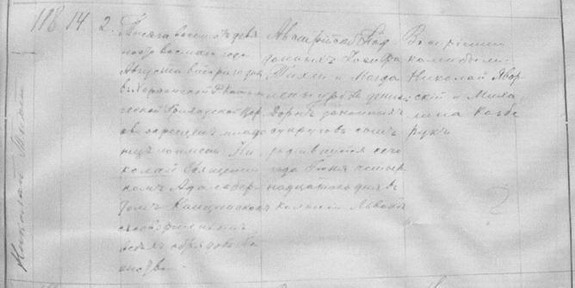
# 118. Name: Nikolai Tichy
Date, born / baptized: 14 / 2
When, where, who, and how at baptism: 02 August
1898 , in Kherson roman Catholic church parish, a baby
named Nikolai was baptized by priest Adolberg with the
observation of all the ceremonies and sacraments.
Parents, when, and from where, in which parish the baptized
was born: Austrian Citizen Joseph Tichy and Magdalena
born Dorn, legal spouses, son born the same year on 14
June in the colony of Lvove.
Godparents and those present: Godparents were Nikolai
Yavorsky and Miklalira Kasberuk.
Translation by Inna Stryukova of Nikolaev , Ukraine . September
2008.
______________________________________
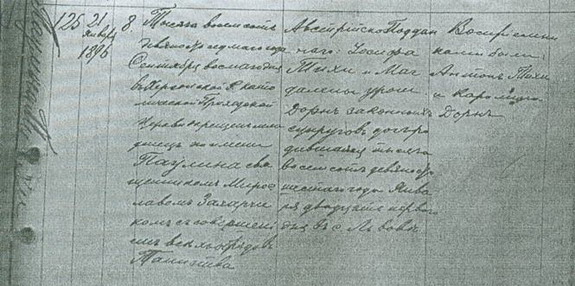
No. 125- Name: Paulina Tichy
Date 21 January, 1896 -Baptised, 8
When, where, who and how was baptized: Eighteen ninety
seven, 08 September in Kherson Roman Catholic Church
Parish, a baby named Paulina, was baptized by priest Miroslav
Zacharchik with the observation of all the ceremonies
and sacraments.
Parents, when and from where , i.e. in which parish the
baptised was born. Austrian citizen Joseph Tichy’s
and Magdalena, (born Dorn). Legal spouses, daughter born
1896, 21 January in the colony of Lvove.
Godparents and those present. Godparents were: Anton
Tichy and Karolina Dorn
Translation by Valentina Fromm Kramer. September
2008.
_____________________________
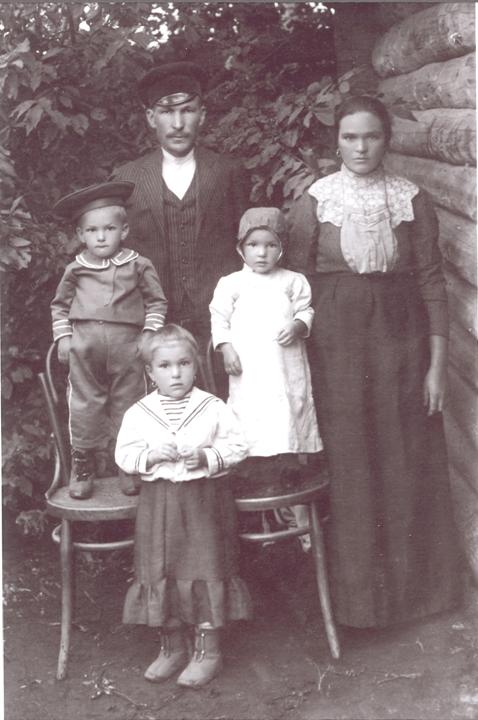
Written on the back side in Russian:
Ivan Josephovitch Tichy with family, wife Karolina, Magdalena
and Alexander Tichy. From Magdalena Tichy. (signed
by Magdalena in her own handwriting as “Magdalena
Tihin”.
Comment: Ivan is the Russianized form of Johann.
_________________________________
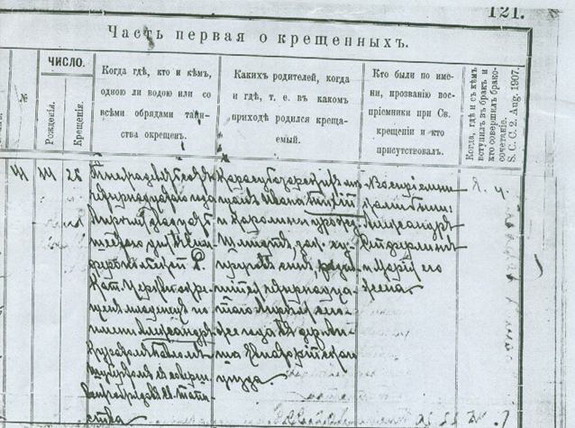
Copy of birth/baptism record of Alexander Tichy, son
of Ivan (Johann) Tichy and Karolina Schmidt.
# 41 – born / baptized -- 14 / 26
When, where, who and by whom, with water only or all
the holy ceremony observed. 26 April 1914 in Simferopol
Catholic Church, a baby Alexander by name was baptized
by curator Pavel Schubert with all the holy ceremony observed.
Who the parents are, when and where, in which parish
the baptized was born. A son of petty bourgeois from
Karasubazar, Ivan Tichy and Caroline born Schmidt, a married
couple, was born on 14 April the same year in the village
of Aisha , Eupatoria uyezd.
Names and ranks of the Godparents and those being present
at the ceremony. The Godparents were Alexander Seiferling
and his wife Maria.
Comment: The only Alexander Seiferling
I have found in the records for this time-frame was married
to Elisabeth Ruckhaber . I know from other Church
records that Ruckhabers also lived in Anakoj-Eli which
connects to the Tichy family. Perhaps Elisabeth was
also known as Maria.
Joseph Tichy had a brother named Anton, born ca. 1850’s.
Anton Tichy married Karolina Dorn 26 Oct 1872, according
to Nikolajew City Parish records. Karolina is most
likely a sister to Joseph’s wife. Karolina
is also referred to as Katarina in at least one record.
________________________________
I have these records for Anton Tichy and Karolina
Dorn.
Part One. about Baptised – Anton Tichy
No. 110
Date born Decenber 2, 1880 Baptised January 28,
1883
When, where, who and how was baptized. Eighteen eighty
three, Jauary 28 in Kherson Roman Cahtolic Church Parish
a baby named Anton was baptized by priest Miroslav Zaharchik
with the observation of all the ceremonies sacraments.
Parents, when and from where , i.e. in which parish the
baptisedd was born Austrian citizen, Anton Tihy and his
wife Karolina (born Dorn) legal spouse a baby son, December
2, 1880 in the Chutor Barschaluvka.
Godparents and those present. Godparents were: Ivan
Gernich and his wife Margarita
Part One. about Baptised – Katherina Tichy
Date born 22 Baptised 20
When, where, who and how was baptized. Eighteen ninety
two, June 20, in Kherson Roman Cahtolic Church Parish
a baby named Kathernina was baptized by priest M. Berleson
with the observation of all the ceremonies sacraments.
Parents, when and from where , i.e. in which parish the
baptisedd was born. Citizen Anton Tihy and his wife Katherina
(born Dorn) legal spouse, a daughter born in this year
January 22 in colony Klosterdorf.
Godparents and those present. Godparents were: Johan
Benko and his wife Katherina Benko
--translations by Valentina Fromm Kramer, September 2008.
_______________________________
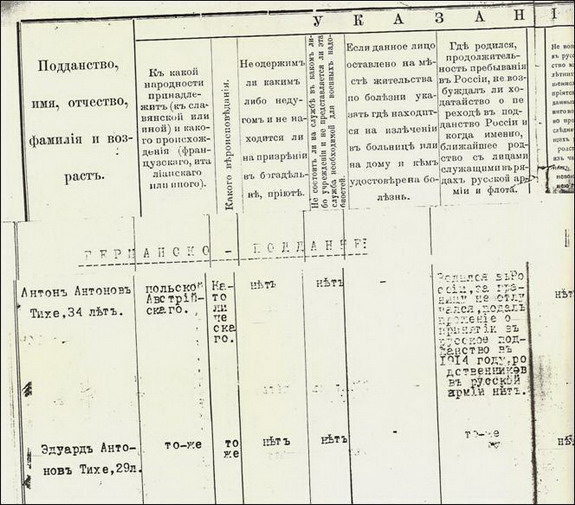
1917 Census Card, Simferopol Archive
(translation by Inna Stryukova )
Fond 529, opus 1, delo 111, list 1413
1. Anton Antonovich Tichy, 34 yrs, Polish-Austrian
subject, Catholic, healthy, born in Russia, never been
abroad, made a request to be a Russian subject, applied
in 1914, had no relatives in the Russian army, was not
poor.
2. Eduard Antonovich Tichy, 29 yrs, the same information
as above. ________________________________________

St. Petersburg Consistory. 484 – 1 -- 2375
– 297 - # 8 . 16 April 1913 . Bjuten Parish. Eduard
Antonovich Tichy married Katarina Heinrich, daughter of
Daniel. ___________________________________________
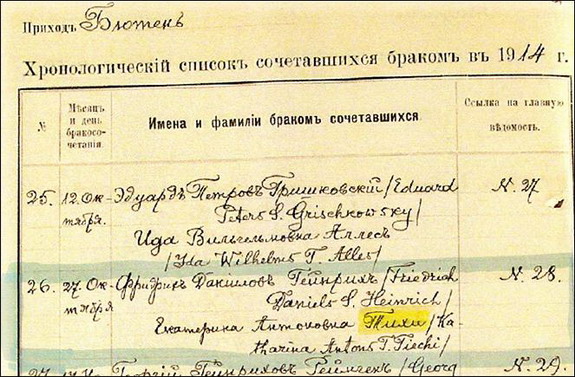
St. Petersburg Consistory. 2378 – 143 - #
26 . 27 October 1914 . Bjyten Parish. Friedrich
Heinrich, son of Daniel, married Katarina Tichy, daughter
of Anton.
These records establish at least three children of Anton
Tichy and Katarina Dorn – Anton 1880, Eduard 1885,
and Katarina 1892.
_______________________________
Other Tichy Data:
In the “Book of Memory” of people who perished
during WWII, there are two more Tichy men listed:
o Tichy, I.A. , born . . . . . . (can’t read
it) district, village of Kainash (Krasnoflotskoye), Russia
, a soldier is missing.
o Tichy, Alexander Yakovlevich (Jakob), a sergeant,
was killed on 28 March 1942 , buried in the common grave
in Prudnikovo.
Comments:
Tichy, I.A. is likely a son of Anton Tichy. The
“I” could be for Ivan or Johann, or it could
be for Iosef or Joseph. The birth village of Kainash
is interesting because Anna Marie Schafer, a sister to
my great-grandfather Anton Schafer, was born in Kainash
in 1861.
To date I have found no Jakob Tichy, so I am wondering
if Tichy, Alexander was perhaps the son of Ivan (Johann)
Tichy. See birth / baptism record on page 30.
_______________________
Nikolaev Archives 484 – 1 – 2360 –
81 - # 466 .
Birth of Emilie Karezki, 07 October 1906 in Anakai-Eli.
Father – Martin Karezki, Eupatoria petty bourgeois.
Mother – Katherine Kraminski.
Baptism Witnesses – Friedrich Kraminski of Anakai-Eli
and Katherine Tige of Anakai-Eli.
Comments: Because Rose Tichy, Grandmother's
sister was married to Fred Kraminski, I am guessing that
Katherine Tige in this record is actually Karoline Tichy,
nee Dorn, wife of Anton Tichy. However, Anton and Karolina
also had a Katherine Tichy, born 1892 in Klosterdorf, daughter
but she would have been 14 yrs old.
______________________________
Was Josef Tichy an Austrian citizen? Uncle Jack in his 1994 video-taped interview says his
grandfather was born in Austria . Several birth and marriage
records refer to Josef as an Austrian citizen. It
is likely that Josef’s grandfather was Franz Tichy
born before 1800, likely in Austrian Galicia. Today
this region is part of western Ukraine , but in Franz
Tichy’s time, it was part of the Austrian-Hungarian
empire. Records show Franz Tichy to be a municipal
secretary, for his signature appears on several documents
in the Glückstal colonies. If he never became
a land-owner, he would never have acquired Russian citizenship. Therefore,
he and his descendants would continue to retain the designation
as Austrian citizens. As late as 1914, Anton and
Eduard Tichy were referred to as Polish-Austrian subjects,
and had applied for Russian citizenship.
________________________________
History of Lvove Colony
At least three children of Joseph Tichy and Magdalena
Dorn were born in Lvove colony, about 50 km east of the
city of Kherson , Ukraine . Elisabeth’s passport
gives Kherson as her birthplace, but I would interpret
this as also being Lvove colony, Kherson parish. Uncle
Nick’s memory is that she was born in Taku-Eli where
he was born.
Following is a history of Lvove taken from http://marcusfamilyweb.com/history.html This
website also includes a 1877 village map which shows in
Household # 65 a “Josef Fiting”. I am
wondering if this could not be Tichy, lost in the translation. Is
“Fiting” a Jewish name? And of course
the interesting question – Why was Joseph Tichy
living in a Jewish Colony?
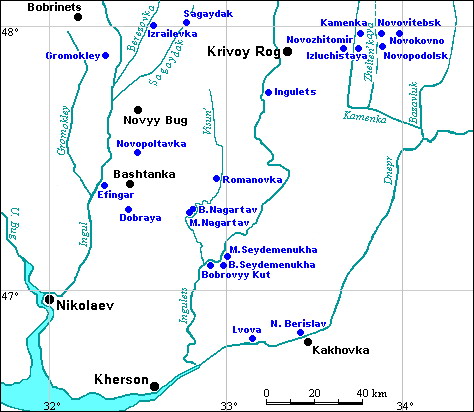
Lvovo was founded in 1841 on the right bank of the Dnepr
by Jews from the provinces of Vitebsk and Mogilev in Belarus
. At the time of the establishment they received from
the government 4,759 desyatins and set up 119 agricultural
farms each of an average of 40 desyatins. The number of
Jews increased gradually, and after the agrarian reform,
reached 1,367 souls in 1879. In 1887 the number of farms
in the colony was 181. Because of the severe lack of agricultural
equipment and horses and oxen, many families had to rent
areas to strangers. So were rented 500 desyatins of the
colony’s land. Many tried to leave the place, and
the number of farms fell in 1894 to 136 households.
At the beginning of the twentieth century the number
of farms rose to 272 (in 1906). In agriculture were engaged
then 176 families on an area of 2,760 desyatins, slightly
less than half (2402 desyatin) of the area of land which
they received at the time of the establishment of the
colony. The size of the allotments per farm was not equal.
So 175 farms had at their disposal about 10 desyatins,
for 51 there were 25 desyatins and only 45 had larger
allotments. Amongst them were those who had more than
40 desyatins. Those with less land made a living from
hired work on the large farms. Others worked in industry
and trade, such as the production of butter, cheese, timber
storage, a workshop for blacksmithery and 8 shops. Also
there was on the colony a medical attendant and a pharmacy.
In 1911 the planting of a vineyard was began by JCA and
this improved the income of tens of families. Until the
end of the nineteenth century a port was built on the
Dnepr River , and from it much agricultural produce was
sent, mainly grain. In Lvovo there was a market day on
Wednesdays and two fairs per year. Paramedic Moshe Izranson,
who lived there in the middle of nineteenth century saved
a lot of lifes at the time of cholera and scurvy plagues.
A pharmacy was built in Lvovo before the First World War
and it was owned by a Jew.
In 1869 a biannual government school was established
in the Russian language. There were 107 students and two
teachers. Ten years later there were only 76 students
of 229 school age children on the colony. In 1880 another
school was established with 90 students, but it was closed
15 years later. In 1907 124 students learned in the institution
out of 230 school age children. During the second half
of the nineteenth century officiated in Lvovo the Rabbis
Menakhem Nakhum Sverdlov in the years 1845-1885, and after
him in 1886 his son Eliyahu Yehudah. He was still rabbi
in 1908.
The Civil War caused a great deal of suffering to the
inhabitants of the colony. As a result of the pogroms
65 orphans were left. In the winter of 1920/21 169 people
died of starvation and Typhus. In 1922 were died of starvation
about 200 Jews. The number of inhabitants and farms decreased,
but in the main the livestock was affected. The number
of horses decreased from 670 to 100, the number of cows
from 330 to 100, and in the colony remained 90 wagons
out of a previous 334.
In the middle of the twenties was founded an agricultural
cooperative with 566 members. Its purpose was to assist
in the restoration of the farms. Likewise there was in
the colony a cooperative organization of vintners and
bee keepers. At the end of the twenties was established
a Kolkhoz called Pobeda Ilicha, into which entered 160
farms (the majority). In 1930 was the regional tractor
and the heavy farm equipment station was transferred to
Lvovo and it served 18 kolkhozes in the region.
Several tens of families made a living from three flour
mills, two dairies, a factory producing bricks and from
loading and unloading at the port on the Dnepr River .
In the first half of the twenties Ozet and Joint opened
a clinic and small hospital of 10 beds. From the health
services benefited also villagers of the region. From
February 1920 operated in Lvovo a Jewish village council.
During the twenties many young people left the place
and went to the large cities for work and studies. So
the population of Lvovo was decreased by one third. In
1931 about 71% of Lvovo Jews were members of the Kolkhoz.
In the study year 1922/1923 a school with Yidish as teaching
language was opened and 120 children learned in it with
three teachers. In 1926 113 children learned there. Over
a year the number of students increased to 149. During
the first half of the thirties the school was enlarged
and in 1941 studied in it 158 children with 9 teachers.
During the twenties a school for uneducated adults operated.
In 1926 the agricultural school from Kalinindorf was transferred
to Lvovo. Assistance in setting it up in the early years
was given by Agrojoint and Ozet. The institution had the
use of several tens of desyatins, ten horses and agricultural
equipment. In 1927 studied there about 70 students aged
16 to 21. In 1932/33 studied in the Agrotichnikum about
200 students, some of them not from Lvovo. In the same
year graduated 80 agronoms. The institution had a dormitory
and living there in 1939 were ten students. The school
existed until June 1941. From 1923 there was there an
orphanage with 39 children, of them 27 with no parents.
This institution was manged by two teachers. During the
second half of the thirties, many left the settlement
and many houses stood empty. In 1927 the school was closed
by authorities.
After the outbreak of war between the Soviet Union and
Germany , and with the advance of the front, 300 people
managed to evacuate. The Germans captured Lvovo on the
24th of August 1941 . On the 16th of September 1941 Germans
murdered 404 Jews, on the 11th of October were murdered
70 more Jews and on the 2nd of November were murdered
70, in total 564 people from Lvovo and nearby places,
mainly women, children and elderly. Lvovo was liberated
on the 12th of March 1944 . A monument was erected in
memory of the murdered. About 138 of the people of Lvovo
served as soldiers in the Red Army, most of them Jews.
55 of them fell in the war. 123 were decorated with medals.
At the end of 1990s lived in Lvovo a number of Jewish
families.
Courtesy of: Albert Kaganovich
_________________________________________________________________________
TOM STANGL RESEARCH
Franz Tichy
Franz Tichy had come to the Glückstal District by
1821, probably from Austrian Galicia. He was the Gebietschreiber
(district secretary) on a District report dated 18 Jan.
1822 (SAOR File 252-1-463), regarding 1819-1820 new immigrants
from Galicia , including a Namenlichte Liste (Name List)
of those immigrants quartered in the Glückstal District
[unpublished report, in German and Russian]. He also prepared
a Population Report dated June 1826 [Glückstal3,
Appendix C]. He also prepared the 1830 Kassel Anna hme
[Glückstal1, pp. 251-254]. He married about 1821
to Margaretha Geckenheimer, who appeared in the 1818 Glückstal
Census, having arrived with her family in 1817 [1818 GlkCensus].
They had three children in Glückstal, 1833-1836 –
Augustina Rosina (b. 8 Nov. 1833 ; d. 29 May 1834 ); Franz
#1 (b. 11 March, d. 27 March 1835 ); Rosalia (b. 18 Feb.
1836 ). Apparently Franz Tichy moved his family to Nikolajew
Province in 1836-1837.
A son, Franz Tichy, was born in Michailowka on 20 Nov.
1837 (Nikolajew Parish record). Michailowka may be the
Falz-Fein estate (now Mihajlivka) located south of Cherson
City near the Crimean Peninsula, or it may be a Ukrainian
town (now Mikolaivka) located about 100 km northwest of
Nikolajew City, about 28 km south of Wosnesensk, west
of the Pivdennij (Eastern) Bug River. Because of evidence
that later generations of the Tichy family eventually
lived in several Crimean villages, Michailowka was probably
the Falz-Fein estate. On this birth record, Franz Tichy
was listed as a Catholic Oesterreicherisch Unterthan (Austrian
citizen), with his wife, Margaretha Geckenheimer, as Lutheran.
[LDSStP]
A daughter, Maria Christina Friederika Tichy (b. 27 Jan.
1827 , Glückstal), was confirmed in Odessa on 14
June 1842 . She married in Odessa on 19 Oct. 1847 to Johann
Jacob Forsch (a.k.a. Johannes, shoemaker from Freudental).
Several children were born and died in Odessa , from 1848
to the 1870s. Johann Jacob Forsch died in Odessa on 4
Feb. 1877 (b. ca. 19 Feb. 1820 in Freudental). The Forsch-Tichy
family is found in the 1841-1860 Odessa City Family Book,
page 113 (SAOR File 630-1-355), listing six children born
in Odessa City , 1848-1853 [OdCityFamBk1].
By 1843, Franz Tichy had moved his family to Alt Postal,
Bessarabia , where his wife died. Margaretha (Geckenheimer)
Tichy died on 2 March 1843 , age 42 (b. ca. 1800), born
in Hagsfeld, Karlsruhe , Baden . No further documentation
has been found to reveal where Franz Tichy might have
moved after his wife died. However, it appears that a
member of his family lived in Glückstal in 1844.
In 1844, Anton Tichy and his wife, Margaretha Pfoh, had
a child in Glückstal – Maria Margaretha Tichy,
who was born in Glückstal on 31 March 1844 ; both
parents were labeled as evangelical religion. How this
family fits in the Tichy family is not known; however,
it is assumed that Anton was the son of Franz Tichy and
Margaretha Geckenheimer, probably born in Glückstal
ca. 1821-1823. Margaretha Pfoh was probably a Catholic
from München or Rastadt [Stumpp1, pp. 394 & 785].
She may be the daughter of Joseph Pfoh (1816 München
RL:36, age 21, son of Michael Pfoh from Hilsbach, Sinsheim,
Baden ). The fate of this family is not known, but they
apparently initially moved to Nikolajew Province .
An Anton Tichy married in Nikolajew Parish on 26 Oct.
1872 to Katharina Dorn. A Josephine Tichy married in Alt-Schwedendorf
Parish on 27 Nov. 1881 to Johann Matteika; and an Alois
Tichy married in Nikolajew Parish on 2 Nov. 1882 to Elisabeth
Mateika. It is assumed that the later two couples are
sister and brother marrying brother and sister. These
three Tichys could be the children of Anton Tichy and
Margaretha Pfoh, born in unknown locations in Nikolajew
Province between 1850 to 1860.
It is known that the Tichy family name was in Crimea
. In the 1917 Census for the village of Taku-Eli, two
Tichy brothers were listed – Anton Antonovitch Tichy,
age 34 (b. ca. 1883), Polish-Austrian subject, Catholic,
born in Russia, never been abroad, made a request to become
a Russian citizen; and Eduard Antonovich Tichy, age 29
(b. ca. 1888), same information as his brother. These
brothers, whose father's name was Anton, may be sons of
Anton Tichy and Katharina Dorn, who married in Nikolajew
Parish in 1872. The Tichy family was also in the village
of Anakoi-Eli , Tabuldinskaya volost, Simferopol Uezd.
The 1917 Census lists Fyodor Josephovitch Tichy, age 29
(b. ca. 1888), a tenant in Anakoi-Eli, who was absent
for two years as he had been drafted into the army. His
sister, Elisabeth Tichy (b. 1892 Anakoi-Eli; d. 1943),
was the grandmother of Merv Weiss , a descendant of Franz
Weiss from 1816 GRL :32, who moved to Selz, Odessa Province
ca. 1817. It is probable that the father of Fyodor and
Elisabeth Tichy, Joseph Tichy, was a son of Anton Tichy
and Margaretha Pfoh.
I believe that Franz Tichy was on the Falz-Fein estate
of Michailowka in 1837 when his son, Franz was born. This
estate is found on Stumpp's Nikolajew Gebiet map, south
of the city of Cherson , not far from the neck of land
leading into the Crimean Peninsula . If I am correct
on this location, it might help explain why the Tichy
family eventually was found in Nikolajew Province and
then in Crimea .
___________________________
Comments: subsequent to Tom’s
work, I learned that Joseph Tichy was married to Magdalena
Dorn, and their marriage record clearly lists Joseph’s
parents as Anton Tichy and Margaretha Pfoh. This
information helped us to build the Tichy family groups. The
un-proven hypothesis is that the Anton Tichy who married
Margaretha Pfoh is indeed the son of Franz Tichy and Margaretha
Geckenheimer.
Tom Stangl is a prominent researcher of the Germans from
Russia . Much of his research has been concentrated
in the Glückstal Colonies. My Weiss ancestor,
Franz Weiss, lived in the colony of Glückstal from
1805 to 1817, and this is how I first met Tom. Years
later, our research paths would cross again with my ancestor
Franz Tichy. I am extremely grateful for Tom’s
work in connecting my Tichy information to his. It
is quite likely that my 3rd Gr-Grandfather Franz Tichy
knew my 3rd Gr-Grandfather Franz Weiss during the time
that both were living in Glückstal in the early 1800’s.
20 Mar 2009. Three more files have recently been located
in Odessa State Archives showing the signature of Franz
Tichy.
_________________________________
Found in Odessa Archives by Sergey
Yelizarov
File 6-1- 8714
"On priest Doll's request as for 83 Roubles 50 Copecks
debt to be exacted from foreigner TICHY"
1846
A letter No 124 dated October 24, 1846 of Nikolayev Evangelical
divisional priest addressed to the Board Chairman where
he asks to exact from foreigner Franz Tichy holding a
clerk office at one of the colonies within the Board jurisdiction,
80 Roubles in assignations borrowed from the petitioner
several years ago when he, Tichy served as a manager at
the estate of admiral Greig. Over that he, the petitioner
last year in Odessa gave Tichy 3 Roubles 50 Copecks in
assignations more and as a result he, Tichy owes him 83
Roubles 50 Copecks so the petitioner asks for soonest
exaction of the amount mentioned.
/Novaya Odessa/
Comments: From 1816 to 1833, Admiral
Elexey Greig (or Grieg) was Military Governor of Nikolaev. It
appears from the above record that he had a private estate
somewhere in the area around Nikolaev, and that my ancestor
Franz Tichy was the manager for this estate around 1840
to 1845. Determining the location of this estate
will be part of my on-going research.
______________________________________
Next Steps – researching the family and location
origins of Franz Tichy, born late 1700’s?
This Family Group Record can be found
at familysearch.org
Franz Tichy, born 1712, Kunstat , Moravia , Czechoslovakia
Married 30 Apil 1761 in Kunstat , Moravia
+Marina Kada, born about 1740 in Kunstat , Moravia , Czechoslovakia
Children:
· Johann Tichy, christened 24 Jun 1761 , Kunstat
, Moravia
· Anna Tichy, christened 14 Apr 1768 , Kunstat
· Franz Tichy, christened 18 Aug 1770 , Kunstat
· Georg Tichy, christened 31 Mar 1744 , Kunstat
________________________________________________________
Descendants of Franz TICHY:
Franz TICHY b. bef 1800
+ Margaretha GECKENHEIMER b. abt 1800 m. abt 1821 d.
1843
I. Anton TICHY b. abt 1823 **un-documented ASSUMPTUION
+ Margaretha PFOH
1. Maria Margaretha TICHY b. 1844
2. Joseph TICHY b. 1850 d. abt 1899
+ Magdalena DORN b. 1862 m. 1881 d. aft 1925
a. Emelia TICHY b. 1880
b. Rose TICHY d. abt 1918/19
c. Ivan TICHY
d. Fyodor (Theodor) TICHY b. 1888
e. Fredrick TICHY
f. Elisabeth TICHY b. 1892 d. 1943 -- my maternal
grandmother
g. Joseph TICHY b. 1893 d. abt 1921/22
h. Christopher TICHY
i. Paulina TICHY b. 1896
j. Nikolai TICHY b. 1898
3. Anton TICHY b. 1850's
+ Katharina/Karolina DORN m. 1872
a. Anton Antonovich TICHY b. 1880
b. Eduard Antonovich TICHY b. 1885/86
c. Katharina Antonovna TICHY b. 1892
4. Josephine TICHY b. 1850's
+ Johann MATTEIKA m. 1881
5. Alois TICHY b. 1850's
+ Elisabeth MATTEIKA m. 1882
a. Josef Aloisii TICHY c. 1887
II. Maria Christina Friederika TICHY b. 1827
+ Johann Jakob FORSCH b. 1820 m. 1847 d. 1877
1. Theresie FORSCH b. 1852 d. 1875
2 . Marie FORSCH b. 1856 d. 1878
3 . Caroline FORSCH b. 1858 d. 1871
4 . Julie FORSCH b. 1864
5 . Mathilde FORSCH b. 1870 d. 1871
III. Augustina Rosina TICHY b. 1833
IV. Franz # 1 TICHY b. 1835 d. 1835
V. Rosalia TICHY b. 1836
VI. Franz TICHY b. 1837
_______________________________
The DORN Family
Researching my Tichy family background lead to the Dorn
family, and I know now that my grandmother Elisabeth Tichy
was a first cousin to:
1. Johann Dorn who married Jakobina Schafer –
Schuler, Lancer
2. Elisabeth Dorn who married Peter Ries –
Fox Valley , Liebenthal
3. Rose Dorn who married John Grünwald. –
Fox Valley , Richmound
4. Gustav Dorn (see photo)
5. Anna Dorn who married “Bulekarb” ? (see
photo) – no further information.
All five Dorns above were children of Johann Dorn(1851)
and Maria Benko.
Johann Dorn (1851) died in 09 Jan 1907 in Anakoi-Eli.
I have a copy of the death record. He was known to
the Trotsky family, cited in Leon Trotsky’s book
“My Life”, Chapter II, page
32:
"The German settlers constituted a group apart. There
were some really rich men among them. They stood more
firmly on their feet than the others. Their domestic relations
were stricter, their sons were seldom sent to be educated
in town, their daughters habitually worked in the fields.
Their houses were built of brick with iron roofs painted
green or red, their horses were well bred, their harness
was strong, their spring carts were called “German
wagons.” Our nearest neighbor among the Germans
was Ivan Ivanovich Dorn, a fat, active man with low shoes
on his bare feet, with a tanned and bristling face, and
gray hair. He always drove about in a fine, bright-painted
wagon drawn by black stallions whose hoofs thundered over
the ground. And there were many of these Dorns."
_______________________________________________
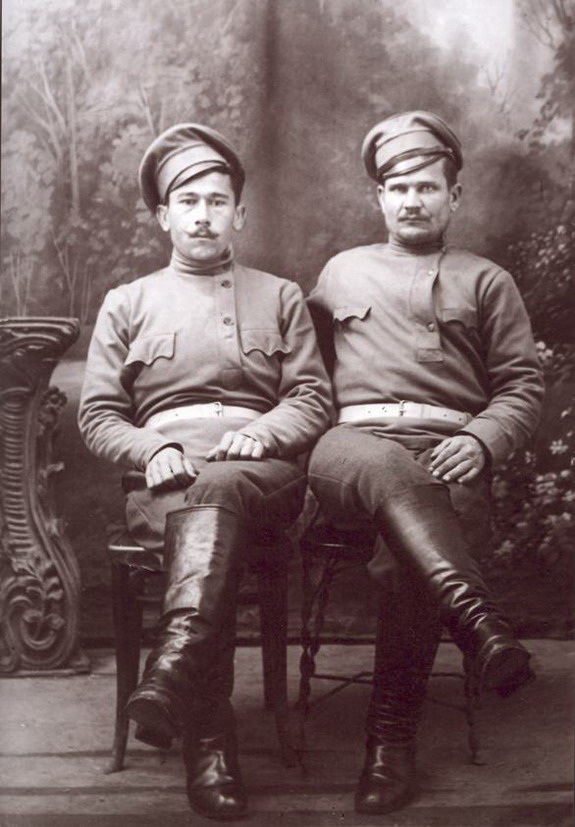
written on the back in Russian: 01 February 1918
. To my dear friend Philip Antonovich Schafer from
his friend, Gustav Ivanovich Dorn, as a memento.
Comments: I do not know which of
these men is Gustav Dorn. I do not know the other
soldier. February 1, 1918 was an historic day in
Russia . It was the day the Lenin administration
decreed that Russia discontinue the use of the Julian
calendar, and convert to the Gregorian calendar used by
the western world. So February 1, 1918 was declared
to be February 14, 1918 , moving Russia ’s calendar
ahead 13 days. In academic reports you will often
see a date followed by O.S or N.S., meaning “old
style” or “new style”. Thus a record
found in an archive with the date 22 May 1892 would be
written in an academic report as 22 May 1892 O.S. The
change in calendar dates has lead to much confusion as
to “what day exactly was Grandfather born?” Some
emigrating pioneers gave their birth-dates “old-
style”, and some gave them “new style”
with 13 days added.
______________________________________________
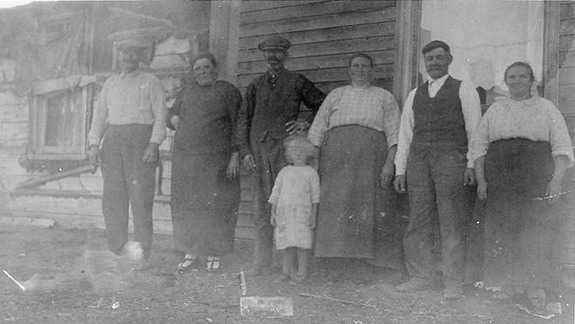
L-R: Johann Dorn & Jakobina (Schafer), Peter
Ries & Elisabeth (Dorn), John Grünewald &
Rosa (Dorn). Early Homestead days in south-western
Saskatchewan .
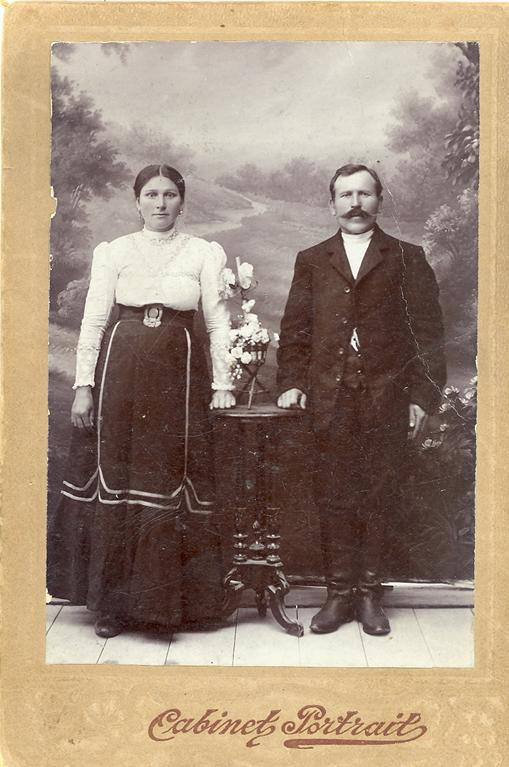
written on the back in Russian: To my relative-in-law,
Philip Antonovich Schafer, in memory of his father, from
me, Bulekarb Bulekarbovich Anakov and Anna .
Comments: I believe this is Anna
Dorn and her husband, because of the reference to being
a relative by marriage, rather than a direct genetic relative. Philip’s
father, Anton Schafer and my great-grandfather, died in
February 1908, according to oral family history.
_________________________
Descendants of Johann DORN
I. Johann DORN
+ Katherina MEINERT
1. Johann DORN b. 1851 d. 1907
+ Maria BENKO
1-1. Rose DORN b. 1882 d. 1966
+ John GRÜNWALD b. 1883 m. 1906 d. 1953
a. Walter GRÜNWALD
b. John Jr. GRÜNWALD b. 1910 d. 1988
c. Katherine GRÜNWALD b. 1913 d. 2004
d. Joseph GRÜNWALD b. 1914 d. 1973
e. Peter GRÜNWALD b. 1916 d. 1944
f. Elizabeth GRÜNWALD b. 1917
g. Mary GRÜNWALD b. 1919 d. 1983
h. Ann GRÜNWALD b. 1920 d. 1930
i. Lena GRÜNWALD b. 1922 d. 1991
j. Adam GRÜNWALD b. 1924 d. 1989
k. Sam GRÜNWALD b. 1925 d. 1972
1-2. Johann DORN b. 1885 d. 1926
+ Jacobina SCHAFER b. 1880 d. 1933
a. Gottlieb DORN b. abt 1905 d. abt 1977
b. Phyllis (Philippina) DORN b. 1911 d. 1972
c. Rosie DORN b. aft 1911
d. Mary DORN
e. Sally DORN
f. Ann DORN
g. John DORN
1-3. Elizabeth DORN b. 1887 d. 1928
+ Peter RIES d. abt 1967
a. Rosalia RIES b. 1908
b. Beatrice (Beata) RIES b. 1911
c. Elizabeth RIES b. 1916 d. 1952
d. Peter RIES
e. Phyllis RIES b. 1917
1-4. Gustav DORN c. 1889
1-5. Anna DORN b. 1892
2. Katharina/Karolina DORN
+ Anton TICHY b. 1850's m. 1872
2-1. Anton Antonovich TICHY b. 1880
2-2. Eduard Antonovich TICHY b. 1885/86
+ Katherina HEINRICH m. 1913
2-3. Katharina Antonovna TICHY b. 1892
+ Friedrich HEINRICH m. 1914
3. Magdalena DORN b. 1862 d. aft 1925
+ Joseph TICHY b. 1850 m. 1881 d. abt 1899
3-1. Emelia TICHY b. 1880
3-2. Rose TICHY d. abt 1923
+ Fred KRAMINSKY
3-3. Ivan TICHY
+ Carolina SCHMIDT
a. Magdalena TICHY
b. Alexander TICHY b. 1914
4 Fyodor (Theodor) TICHY b. 1888
+ (---) (unknown)
a. Nikolay TICHY b. 1905 d. 1944
b. Ivan TICHY b. 1928 d. 1944
5 Fredrick TICHY
6 Elisabeth TICHY b. 1892 d. 1943 -- my maternal
grandmother
+ Philip SCHAFER b. 1887 m. abt 1911 d. 1956
a. Nickodemus SCHAFER b. 1912 d. 1992
b. Katherina SCHAFER b. 1912 d. 2001
c. Philip SCHAFER b. 1916 d. aft 1943
d. Jacob SCHAFER b. 1918 d. 1995
e. Ann SCHAFER b. 1919/22
f. Rose SCHAFER b. 1923 d. 1990
7 Joseph TICHY b. 1893 d. abt 1921/22
+ Cecilia Antonovna (---) b. 1890 d. 1955
a. Paul-Josef b. 1921
b. Peter TICHY b. 1922
8 Christopher TICHY
9 Paulina TICHY b. 1896
10 Nikolai TICHY b. 1898
_________________________________________
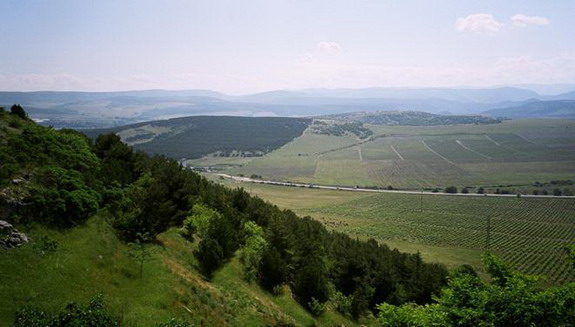
One of my favorite photos of Crimea , taken near Simferopol
on the road from Sevastopol . 2005
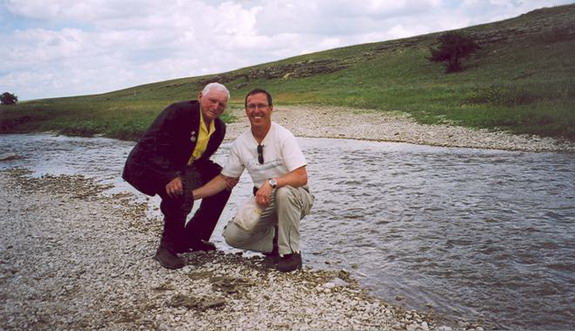
Konstantin Ponomarenko was born in Anakoj-Eli in 1921,
two years before my mother. Here we had to cross
the Burul’cha River to get to the site where the
village once stood. June 2005
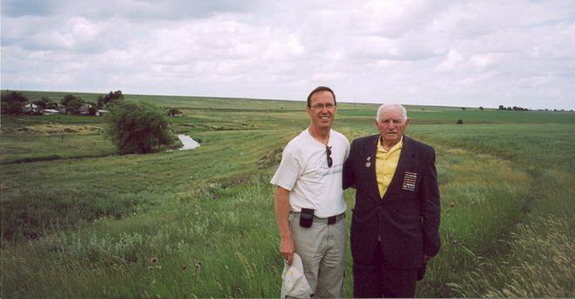
Standing on the site of Anakoj-Eli. You can see
a bend of the Burul’cha River. Behind us to
the north, the buildings mark the site of Taku-Eli, the
village where Grandmother’s mother lived. 2005.
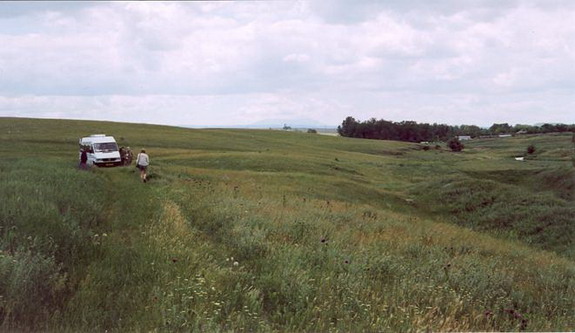
Looking towards the south from Anakoj-Eli. I took
this photo to show the beginnings of the Yalta Coast mountains
in the distance, which my grandfather would have looked
at every day. Yalta is about 72 km in a straight-line
from Anakoj-Eli.
HISTORY OF ANAKOJ- ELI
--as remembered by Konstantin Ponomarenko
-- story and letters translated by Inna Stryukova
-- editing by Merv Weiss , November 06, 2005 .
The lovely Burulcha River begins in the mountains of
southern Crimea . In winter it is small and does
not have much water. But when spring comes and the
snow begins to melt in the mountains, the river gets bigger
and its water flows all over the valley. In this
beautiful valley there were many small villages which
had been part of Karasu-Bazar or Kai-Ma Khan’s estate. The
villages had names which were given to them by the Tatars. Burulcha
district consisted of 25 villages, including Anakoj-Eli,
Tuku-Eli, Sarachel, Staraya Burulcha, Novaya Burulcha,
and the village of Baraskhan in between them, Karlovka,
Arganchuk, and others. Along with other villages
in the valley, there were also the villages where mainly
the German population lived. They were Terekli-Shikel,
Kerklech, Rosental, Neusatz, and others.
After Crimea had been joined to the Russian Empire in
1783 the tsarist government started populating the peninsula. Part
of the Tatar population emigrated to Turkey . During
this time, both Russian and Ukrainian families moved into
these Crimean villages. At the beginning of the 19th
century, foreigners were allowed to settle in Crimea ,
under very advantageous conditions. Thus, Germans,
Greeks, Bulgarians, Armenian, and others appeared in Crimea
. Among the villagers in Anakoj-Eli there were two
Tatar families, the Estonian family, the Gypsy family,
Russians and Germans. Everyone got along well. Those
who were richer helped families with many children, and
widows of soldiers who had been killed during World War
I.
The land in our valley, thirty thousand hectares, was
owned by landlord Rusov, who lived in Odessa . Later
all the land belonged to landlord Dick. The manager
was a Schmidt. In 1924, according the Decree on Land,
the land was confiscated from landlord Dick and given
to the peasants. He fled to France . The four-year
Civil War, which began really in 1914, was over in Crimea
in 1920. There were many foreign war prisoners in
Crimea at that time.
Staraya Burulcha was the capital village because it was
the landlord’s estate. His three two-storeyed
houses were situated there, one for the landlord, and
two for his workers. There were also other dwelling
houses, grain-storage buildings, a stable, a blacksmith
shop, a carpentry shop, a canteen and dining area, and
barns for livestock. The stockyards were surrounded
by high fences.
Anakoj-Eli was situated on the hills on the right bank
of the Burulcha River . There were about 25 houses
there, the design of which was rather primitive. They
were built of stone and “kalyb”. Kalyb
was a mixture of clay and finely cut straw. They
kneaded it with the help of horses, or by feet. Then
they put it into moulds and left it to dry. All the
new settlers built this way. The houses in Anakoj-Eli
were covered with the soil and ash on top. The floors
were also covered with soil. In the middle of the
house there was a stove. People used straw and sunflower
stalks for fuel. In summer, those people who had
livestock made small blocks of manure and dried them on
the stone fences, on the barns and other farm buildings. I
do not know why, but people did not cut wood [for fuel].
The citizens of Anakoj-Eli were mainly farmers. They
had vegetable gardens which they watered bringing the
water from the creek. There was a meadow which provided
them with grass and hay. They divided it between
the farmers. There was also the “fund”
land which was given to the people who lived near the
forest. The farmers of the village grew grains, vegetables
and orchard crops. The Germans grew much corn. The
main food was the corn flour which they mixed with wheat
and baked the so-called cornbread.
The holidays, weddings, birthdays, and baptisms were
celebrated together. The Orthodox believers visited
the Russian Church . The Tatars went to the Mosque. There
were also Prayer Houses. The weddings were big events
because the villages were small at that time and all the
villagers were invited. Before the Revolution of
1917 there were only church weddings. The nationality
was not important. In Anakoj-Eli, there was a family
where Yuri was Russian, and his wife, Philomena, was German.
The main holidays were the New Year, Christmas, Easter
and Baptisms. A very important holiday was Pokrov
[1] . Everybody was looking forward to this holiday. All
the workers were hired until Pokrov, on the eve of which,
the masters had to pay the workers, who then left for
their homes. Only the native villagers remained. The
wages were very low, but the money seemed to be enough.
Before the Revolution, the farmers used horses and oxen
to plough the land. The first tractor, as far as
I remember, appeared in Anakoj-Eli about 1927. It
was given to the village for a short time, but then it
was taken away. I do not remember why or where it
went. The formation of the collective farms started
in 1927. Many of the Germans had already left, some
to Germany , others to Canada and America . The productivity
of the collective farms was low in the first years of
the collectivization. Since the 1930’s the
so-called machine and tractor stations were formed. They
worked for the collectives and the state farms. Soon
the collective and state farms began to own their own
sowing and threshing machines and later the tractors. Before
World War II, the collective in Staraya Burulcha had three
cars. The life of the farmers was getting better
but the peaceful development was interrupted by the war
with Finland first and then with Germany . The World
War II lasted for four long years and brought hardships
and sufferings to all the nations in Europe .
My parents came to Crimea on foot and lived there all
their lives. They could not go back to Ukraine because
their parents died early. They were 14 years old
when they came at the end of the 19th century. I
would like to say that the German nation was, is and will
be noted for being very hard-working, educated, and I
would say, very cultured.
[1] Pokrov is the Feast of the Protection of the Virgin.
It marks the end of the harvest and beginning of winter.
At this point, the harvest is essentially over and the
last fruits to ripen, the pumpkins, are picked on this
day. Another custom was to not cut down the last
sheaf of wheat from a year’s harvest. It was decorated
with ribbons and left standing in the field, until the
following spring, when it was plowed uunder. This
ensured the fertility of the spring planting.
Not part of Konstantin’s remembrances of Anakoj-Eli,
but included in a second letter from Konstantin, are his
thoughts regarding other features of Crimean history.
When I was born [1921] there was a terrible famine in
Russia and Ukraine . My mother told me that America
had helped Russia , Ukraine and Crimea . We are so
grateful for that aid. We remember it and tell every
new generation about it. There was another famine
in 1933. Many people died including innocent children. After
the war, in 1946-1947, food was very scarce in our country. I
came back home from the Front and found out my family
had no bread. This is how all people suffer from
war.
We came back from the Front and began to build up the
economy destroyed by the war. We were happy. Our
lives were improving every year. But our government
made a big mistake by launching thousands of missiles
to develop our military potential. Praise the Lord
the third world war did not happen. All that expensive
military equipment would be of better use by turning it
into scrap metal to build ploughs and combines.
In 1991 another stupid thing was done, a strange and
unnecessary Perestroika. Before perestroika, everything
was well organized. We had good yields of crops. Industries
were productive. Food and education were free. And
then suddenly, within five to ten years, all good things
achieved with such difficulty were ruined, upset and stolen. Millions
of un-employed appeared in the country. It was all
so stupid. And nobody is responsible for anything.
It was decided to give the land to the people. But
the farmers do not have the equipment to work, and they
do not have the money to buy it. People lost their
savings in the banks due to the devaluation of our currency. Few
people want to work on the farms. The young people
tend to move to the cities. The collective and state
farms have been destroyed. It is not profitable to
raise cattle, grow vegetables and fruit. The salaries
are low and people have to go abroad to earn money. Who
will grow the crops? The prices for fuel and for
machines have practically killed farming. That is
the result brought to us by perestroika and the market
economy which we cannot understand. Ten percent of
the population got rich, and the rest became poor and
un-employed.
_______________________________
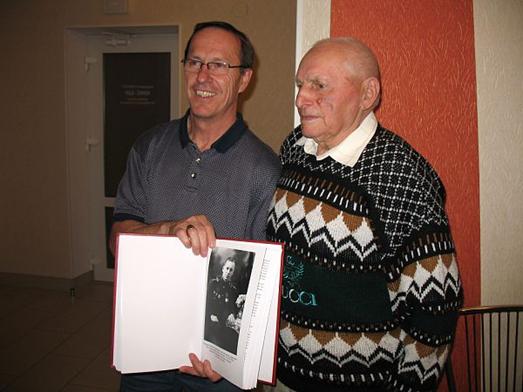
October 2008. I helped Konstantin publish a book
about his experiences as a Soviet soldier during World
War II, based on a daily diary which he kept for five
years.
Konstantin Ponomarenko is a much-decorated and celebrated
Soviet war hero from World War Two. He was wounded
four times. He showed me a deep chest scar from the Battle
of Stalingrad. He was part of the Russian occupation
forces in Austria . He is also a much-celebrated
writer and poet. He has sent me many poems. I
am including two below in which he talks about my visit
to Crimea .
_______________________________
Poem by Konstantin. 29 Nov 2005.
Russian-English translation by Inna Stryukova.
Shefer lived in Russia ,
He served the Russian Tzar.
He defended his Russian homeland
When Napoleon started the war.
Merv Weiss flew from Canada,
It wasn’t his first trip.
To Crimea he came,
Liking everything here.
His ancestors lived in Crimea ,
And the people worked very hard.
So he paid tribute to the land
Where is ancestors used to live.
He searched for his mother’s birthplace,
That place he decided to visit.
A place with a river full of trout,
The village of Anakoy-Eli.
The love for his mother was very abundant,
His memories of her returned, they often did.
So he wanted to see that place,
The village where she was born.
Now he’s in the village,
His heart begins to sing,
He stands alone here, his Patti he did leave,
She waits for him alone, he knew she would.
His daughters and their husbands,
Were also left at home.
Standing on the bank, looking at the river,
He wanted them to see it too.
Now he shows me the document,
My father’s handwriting I saw.
He signed their visas,
Then hurried to the train station.
Yes, our ancestors lived in Crimea ,
They didn’t know each other.
It makes me very happy,
That I have found a brother.
Now here lives Konstantin,
The only person left.
As once our houses stood nearby,
As the apple trees bloomed in the garden.
The village is gone,
Only the railway station is left.
But, Yes, there once was a village here,
It’s people were poor, but they enjoyed their life.
The River Burulcha flows here,
The people ploughed the land.
Little rain brought summer draught,
So they moved to other places.
The land belonged to a land baron,
As thatch grew along the river.
So gardens grew along the river,
So no one expected any trouble.
Now the war was near,
People couldn’t sleep.
They suffered because of the war,
Enough was enough, they decided to immigrate.
My story goes on,
Our mother’s village was found.
Because our ancestors once lived here,
I took a handful of soil.
We couldn’t communicate,
So, Valya and Inna helped us.
We’re thankful to them,
Praise God they were with us.
The telephone is a handy thing,
It rang while at Shura’s.
An old lady was found,
Who said she knew me.
Konstantin was sad when he stopped here,
Because, during the war he kept a diary.
He wanted to type it but could not,
Merv Weiss said that he would.
The diary said many things,
It told of brother-in-arms.
Of fighting and of dying,
As they defend their motherland.
So don’t blame me,
For being in the war.
We soldiers are not to blame,
Or are they guilty.
We must obey their orders,
It seemed we died many times.
Before some took their last breath,
To defend our precious land.
So now my story is done,
As the table is ready for dinner.
Good wine is waiting for us,
As are the stories of those distant days.
____________________________________
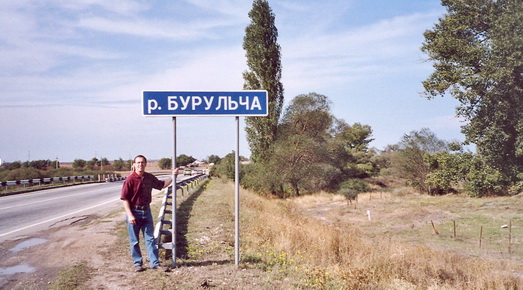
Crossing the Burul’cha River on Highway M17 east
of Simferopol . Oct 2008.
__________________________________________
A CANADIAN COMES, by Konstantin Ponomarenko.
A Weiss family heart stands by the River,
In great anticipation and deep in thought,
He thinks, the years pass, a village disappears,
He came to pay tribute,
His ancestors of long ago
A place where she was born,
A place where she lived.
His mother died a long time ago,
Sorry she was so young!
His mind has a vivid imagination,
He clearly sees her image.
As he stands by the river, deep in thought,
He thinks of his mother,
While Konstantine dances
With a lady from Dakota.
He can feel her hand
Touch his hair tenderly,
Like a wonderful misty dream,
Almost hearing her voice.
Her father puts on his boots,
And takes Rosa to the River,
And this water is from the Burulcha,
It’s the same as they used to drink.
So, a bottle left for Canada ,
To taste and have a drink,
And for his complete fulfillment
There is no greater gift.
END OF PAGE --(page created
21 Mar 2009)
|

